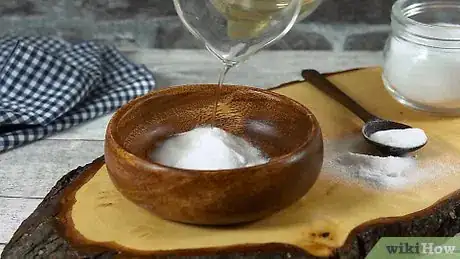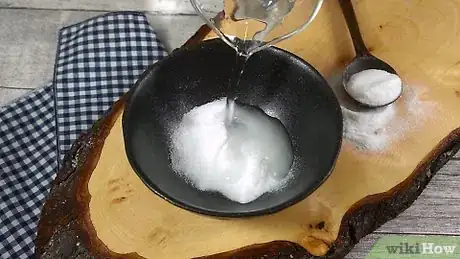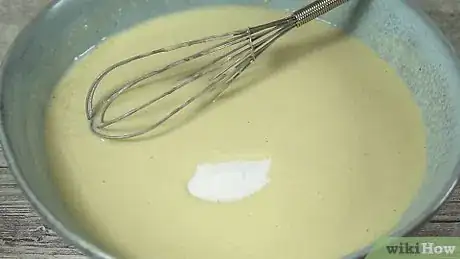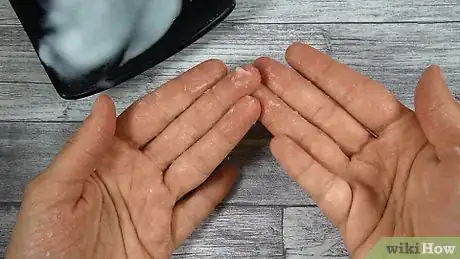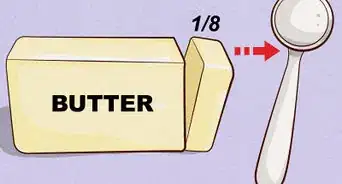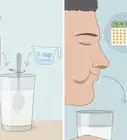This article was co-authored by wikiHow Staff. Our trained team of editors and researchers validate articles for accuracy and comprehensiveness. wikiHow's Content Management Team carefully monitors the work from our editorial staff to ensure that each article is backed by trusted research and meets our high quality standards.
There are 14 references cited in this article, which can be found at the bottom of the page.
The wikiHow Culinary Team also followed the article's instructions and verified that they work.
This article has been viewed 230,386 times.
Learn more...
Baking soda, also known as bicarbonate of soda, is an alkaline substance that reacts to acidic substances, including most liquids. The reaction gives off carbon dioxide gas. Baking soda is often used in baking, personal cleansers and science projects because it fizzes and bubbles when activated by the right acids.
Things You Should Know
- Pour vinegar over baking soda to make an acidic fizz that can be used for cleaning or baking.
- Add lemon juice to baking soda to create a foamy reaction that can improve digestive and kidney health.
- Dump water over baking soda for a mild reaction that can help stomach cramps or acid reflux.
Steps
With Acids
-
1Add vinegar to baking soda. Vinegar is an acid, and baking soda is a base. Thus, if you mix them together, you will get an acid-base reaction. Vinegar is probably the most common way to activate baking soda..
- The reaction can turn the baking soda into a powerful cleaning agent. For example, vinegar and baking soda can be used to clean a kitchen sink.[1]
- Add ¼ cup of warm tap water and 2 tablespoons (29.6 ml) of vinegar into ¼ cup of baking soda to see if the baking soda is still good. If it bubbles, it is. This is called “proofing” the baking soda.[2]
- Vinegar will create a powerful fizz when added to baking soda because of the degree of acidity in it. It's the acetic acid in the vinegar that causes the chemical reaction.
-
2Add lemon to activate baking soda. Lemon or lemon juice will create an alkalizing effect when mixed with baking soda, activating it.
- Add a teaspoon of baking soda to a glass of mineral or other water, and add in the juice from half a lemon. Mix thoroughly before drinking. Some recipes call for adding peppermint leaves or a pinch of salt into the lemon and baking soda mixture, in addition to water.[3]
- This mixture has purported health benefits. Some people believe it can be used to combat acidosis. The mixture helps the body remove toxins and burn fat. It can be helpful for kidney care.[4]
- Drinking lemon juice and baking soda can also improve your digestion and combat acid reflux. It helps to purify your liver and provides some needed nutrients, like vitamin C. Always check with your doctor, though, before using any natural remedies.
Advertisement -
3Add other juices to baking soda. Although lemon juice is one of the most common acids to add to baking soda, other juices can work too.
- Try adding orange juice to baking soda, and you will get bubbles that come from the release of the carbon dioxide. Fruit purees also activate baking soda. Orange juice has more acid in it than most other fruit juices.
- Other juices that will react to baking soda include grape juice, vegetable and fruit juice blends, and limeade.[5] Ketchup can react with baking soda because it contains vinegar.
- The acidic reaction will cause fizzing that indicates the baking soda is fresh and actively working.
For Baking
-
1Add water to the baking soda. Baking soda will dissolve in water. However, there are many uses for baking soda water.
- The baking soda water can help with chronic heartburn or acid reflux by neutralizing stomach acids. All you need is a tablespoon of baking soda in a glass of water.
- Baking soda water can also be used as a mild antiseptic. Remember that baking soda is high in sodium and can have side effects, such as stomach cramping.
- Check with your doctor if you have high blood pressure, are a nursing mother or are pregnant.[6]
-
2Add molasses to baking soda. In addition to reacting in batter, some people have claimed that a mixture of molasses and baking soda can help cure cancer. However, check with your doctor.[7]
- Mix one cup of water with 1 teaspoon of black strap molasses and 1 teaspoon of baking soda. The water should be room temperature.[8]
- You can also use grade B maple syrup, or Manuka honey in place of the black strap molasses.
- Always research alternative health treatments. Do not assume that the solution actually works because of one man’s experience.[9]
-
3Put the baking soda into batter. Baking soda is an essential leavening agent for recipes that call for an acid, such as buttermilk, vinegar, sour cream, yogurt, lemon or orange juice, cocoa, chocolate, honey, maple syrup, fruit, or brown sugar.
- When baking soda interacts with acidic substances such as those above it creates sodium carbonate and carbon dioxide. The carbon dioxide bubbles give rise to baked goods. Follow the amount of baking soda specified on the recipe. Make sure that you do not substitute baking soda for baking powder as they are different!
- Sour cream, yogurt, and molasses also create a bubbling reaction in baked goods. Add one teaspoon of baking soda or follow the recipe’s directions.
- The addition of the baking soda will cause an instant reaction if one of these acidic ingredients is present, so that the batter will expand when the batter is put into the oven. This in turn will cause the batter to rise, creating a lighter texture to baked goods like cookies, quick breads, cakes, and muffins.[10]
Creative Uses
-
1Use baking soda as a healing agent. Baking soda can be used to alleviate the pain of insect bites and poison ivy.
- Create a paste out of baking soda and water, and rub it on the bites. Baking soda will relieve minor skin irritation and itching. Baking soda also neutralizes sunburn. Add ½ cup of baking soda to slightly warm bathwater.
- You can also use baking soda to neutralize stomach acid, thus relieving ailments like indigestion, heartburn and ulcer pain. Only use it as an occasional treatment, and check with a doctor first.
- Dissolve ½ teaspoon in half a glass of water, and take it every two hours. Do not take more than three ½ teaspoons of the mixture if you’re over 50 or more than seven ½ teaspoons in 24 hours.
-
2Use baking soda for your skin. Baking powder has cleansing properties for your skin, not just your appliances!
- You can create a relaxing bath to soak in using baking soda and apple cider.
- Soak your feet in baking soda and exfoliate them by adding three tablespoons of baking soda to a tub of warm water.
- Cleanse your hands by mixing three parts of baking soda with one part of water. This creates a natural hand cleanser to rub away dirt.
-
3Use baking soda on your teeth. Baking soda can be used in place of toothpaste to clean and deodorize your teeth.
- Mix 1 teaspoon of baking soda with a few drops of hydrogen peroxide to form a natural toothpaste. The hydrogen peroxide will activate the baking soda.
- Some toothpastes contain baking soda. Some studies have found those toothpastes are more successful at removing plaque because the baking soda has a mild abrasiveness. Mix six parts of baking soda to one part of sea salt and turn this into a tooth and gum paste by mixing in a blender for 30 seconds.
- Baking soda can also help whiten your teeth. Crush one strawberry together with ½ teaspoon of baking soda. Put the paste on your teeth, and leave for five minutes. Only do this once a week so you don’t damage your teeth enamel.
-
4Use baking soda as a toiletry. Baking soda can be used as a natural deodorant, and combining it with shampoo can add shine to your hair.
- Combine 4 tablespoons (59.1 ml) of baking soda with 10 drops of essential oil to form a natural deodorant. Mix 4 tablespoons of baking soda with 1 tablespoon (14.8 ml) of olive oil to create an exfoliating scrub.
- The baking soda will react with acidic sweat or skin oils chemically and neutralize odors.
- You can also put baking soda in your shampoo to increase shine.[11] A quarter-size amount is all you need in a single shampoo.
-
5Clean a sink or faucets with vinegar and baking soda. Once combined with baking soda, vinegar becomes a powerful cleaning agent.
- Wet the sink. Place baking soda around the sink and then scrub it. Now, line the sink with vinegar-soaked paper towels. Let them sit for 20 minutes.[12]
- You can also clean kitchen faucets (or silverware) by using the same process.
- To make a homemade cleaner for a bathroom, add 1 2/3 cups of baking soda, ½ cup liquid soap, ½ cup water, and 2 tablespoons (29.6 ml) white vinegar.
-
6Use vinegar and baking soda to clean a plugged drain. A mixture of baking soda and vinegar can also be used to clean drains.
- Pour a pot of boiling hot water down the drain, and then pour in ½ cup baking soda. Let it sit.
- Now, pour 1 cup vinegar and 1 cup very hot water down the drain. Cover it with a drain plug. Let it sit for 5 to 10 minutes. The vinegar’s chemical reaction should dislodge the grime in the plugged drain loose. Finally, put another pot of hot water down the drain.[13]
- To make a soda-vinegar cleaning solution for hard water, combine 1 cup of vinegar with 1 tablespoon (14.8 ml) of baking soda. Mix them together in a pot. When the mixture stops foaming, pour it into a bottle.
-
7Make a bottle rocket. Only do this with great care! To make a bottle rocket, you can use vinegar and baking soda.
- Take a piece of paper, and put baking soda on it. Wrap it up tight, and roll the ends tight. Pour vinegar into an empty plastic bottle. Put the baking soda paper roll inside the bottle. Now cork the bottle, shake it and put it on the ground.
- The chemical reaction between the baking soda and vinegar should send the bottle soaring off the ground. The reaction releases gas and turns the baking soda into water and carbon dioxide.[14]
- Make a baking soda volcano by pouring vinegar into baking soda you embed in a snow volcano outside. See how long it takes to overflow.[15]
Community Q&A
-
QuestionCan oil be used to activate baking soda in a similar way to vinegar?
 Community AnswerNo. Only lemon juice, vinegar, and a couple other acids can activate baking soda.
Community AnswerNo. Only lemon juice, vinegar, and a couple other acids can activate baking soda. -
QuestionIs baking powder the same thing as baking soda?
 Community AnswerNo. They are different products with different purposes. Do not use them interchangeably.
Community AnswerNo. They are different products with different purposes. Do not use them interchangeably. -
QuestionWhich is the best acid to use in a science project?
 Community AnswerTry vinegar. It's the most acidic, and it should give you the best bubbling response with mixed with baking soda.
Community AnswerTry vinegar. It's the most acidic, and it should give you the best bubbling response with mixed with baking soda.
Things You'll Need
- Baking soda
- Vinegar or other acidic ingredient
- Water
References
- ↑ http://www.quickanddirtytips.com/education/science/vinegar-baking-soda-the-ultimate-cleanser
- ↑ http://www.craftsy.com/blog/2013/10/difference-between-baking-powder-and-baking-soda/
- ↑ http://homeremediesforlife.com/baking-soda-for-gas/
- ↑ http://steptohealth.com/4-best-benefits-baking-soda-and-lemon/
- ↑ http://kidsactivitiesblog.com/28728/chemical-reactions-for-kids
- ↑ http://www.md-health.com/Drinking-Baking-Soda.html
- ↑ http://drsircus.com/medicine/sodium-bicarbonate-baking-soda/cancer-studies-ph-medicine
- ↑ http://phkillscancer.com/protocol/
- ↑ http://www.medicaldaily.com/curing-cancer-molasses-and-baking-soda-can-vernon-johnstons-story-teach-us-anything-258851
- ↑ http://www.craftsy.com/blog/2013/10/difference-between-baking-powder-and-baking-soda/
- ↑ http://www.health.com/health/gallery/0,,20904678,00.html
- ↑ http://www.rd.com/home/cleaning-organizing/5-best-baking-soda-and-vinegar-cleaning-solutions/
- ↑ http://www.crunchybetty.com/clean-your-drains-with-baking-soda-and-vinegar-surprise
- ↑ http://scienceline.ucsb.edu/getkey.php?key=4147
- ↑ http://www.science-sparks.com/2014/04/30/amazing-baking-soda-experiments/
About This Article
Mixing baking soda with various acids will activate the baking soda and produce carbon dioxide. You can activate baking soda in baked goods by mixing it with vinegar, lemon or orange juice, buttermilk, sour cream, yogurt, cocoa, chocolate, honey, maple syrup, molasses, fruit, brown sugar, or even water. In addition to activating baking soda for cooking, you can also activate baking soda to make a great household cleaner. Just mix 1 2/3 cups of baking soda, ½ cup of liquid soap, ½ cup of water, and 2 tablespoons of white vinegar in a spray bottle for a powerful bathroom cleaner. Activated baking soda can also help to alleviate the pain of insect bites, deodorize your teeth, and clear blocked drains. For more tips, including how to make a cool bottle rocket with baking soda, read on!
